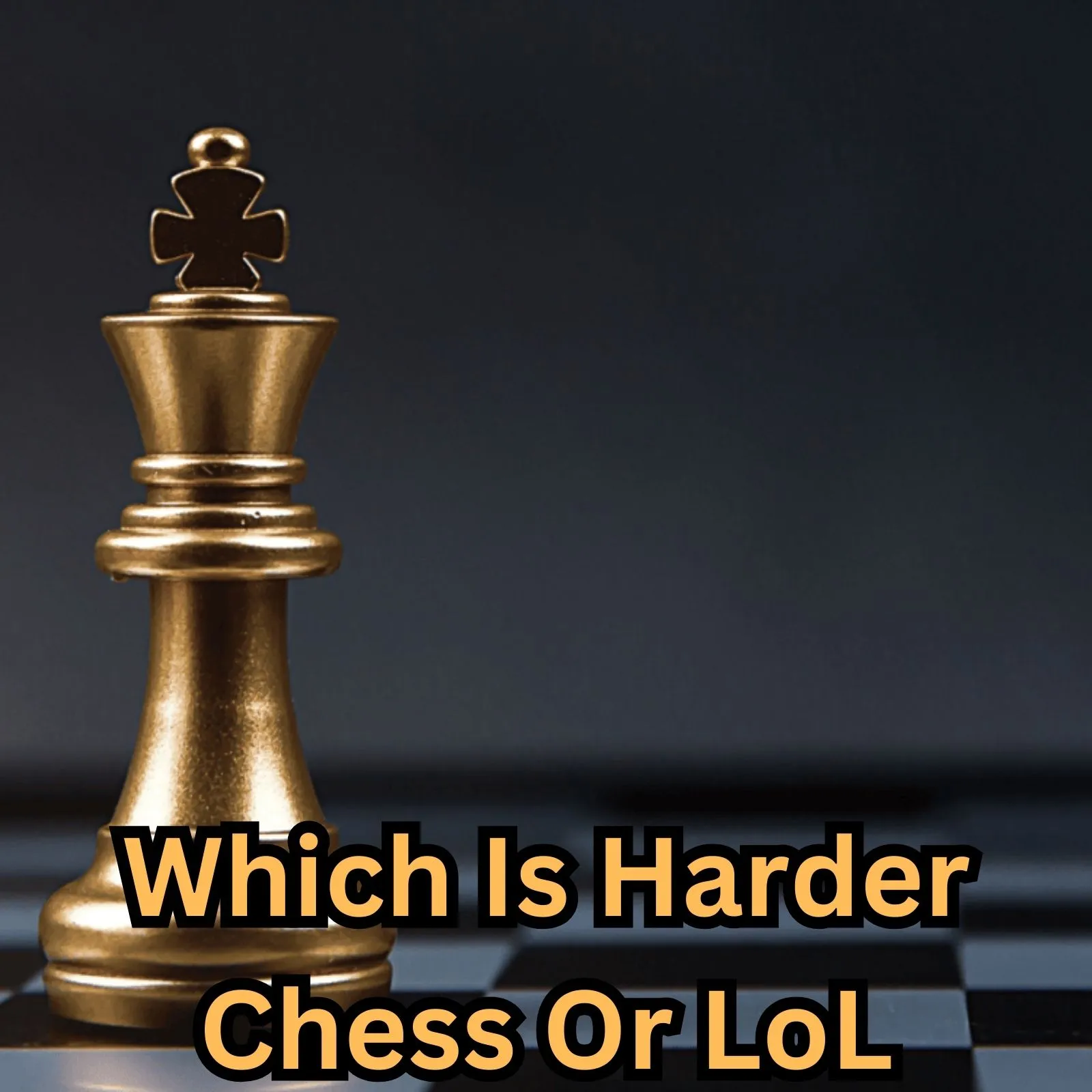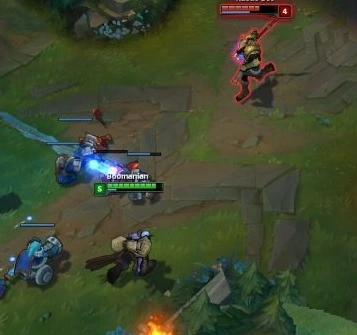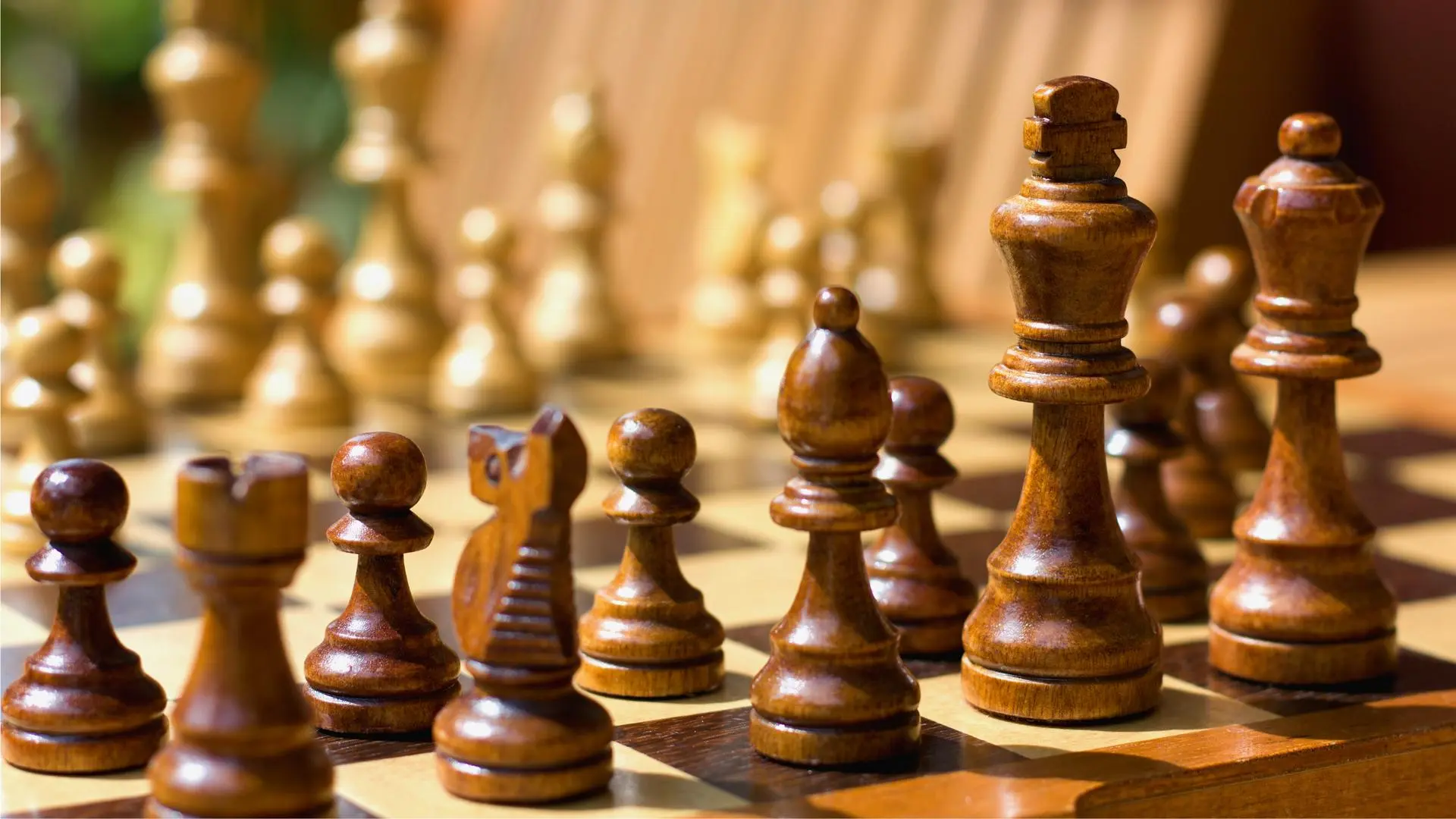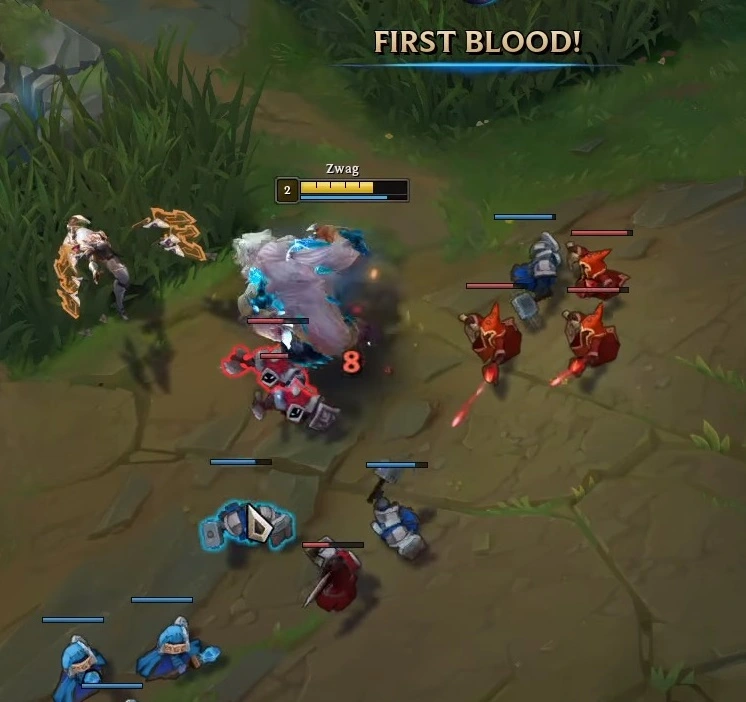
“Exploring the complexities of strategic gameplay, one might wonder if League of Legends (LoL) presents greater difficulty levels than Chess, given its intense real-time challenges and dynamic teamwork dynamics compared to the more predictable yet intricately strategic facets of Chess.
| Factors | Chess | League of Legends |
|---|---|---|
| Learning curve | Straightforward, rules are fixed. | Continuously changing, regular updates alter gameplay mechanics. |
| Dynamic elements | No randomness, entire game is based on player strategies. | Map variables, neutral monsters and buffs affect in-game decisions. |
| Decision making process | Turn-based so allows time for consideration. | Requires quick decisions due to real-time matches. |
| Memory recall | Chess requires moves remembrance and strategic recall. | Players must remember many item properties, champion abilities, cooldown rates etc. |
| Variety of characters/moves | 16 pieces with a total of six different moves. | Over 154 champions each with unique move sets plus a wide array of items. |
Comparing These Two
Contrasting these two popular games can provide an interesting perspective on which one appears more challenging. Understandably, both Chess and LoL pose their unique difficulties and demand varying skills from the player.
From a learning perspective, LoL, with its constant updates and ever-evolving meta, might seem harder to master than chess, which has steady rules and patterns. Character-wise, LoL offers a distinct challenge with a roster of over 154 champions along with intricate move-sets and item options, making it a complex enterprise.
Balancing out this complexity, chess tends to lean heavily on memory recall and developed long-term strategies. Although there’s smaller pool of chess pieces, the infinite combinations on a limited board bring an intellectual challenge that tests deductive reasoning, pattern recognition and problem solving ability.
In terms of decision making, LoL is played in a real-time environment which demands the ability to make instant strategic decisions, underscoring the importance of fast reflexes. In contrast, chess is turn-based; the pace of the game gives players more time to contemplate their moves and strategy – a calmer yet equally intense battle of wits.
The dynamic elements in these games also differ greatly; while chess relies entirely on a sound strategy without any surprise factor, LoL throws in elements like neutral monsters, random events and buffs, adding a layer of unpredictability that can flip a game mid-way.
A Complicated Question

Remembering what Alexander “Hai” Du Lam, one of the most proficient pro-players of LoL, once said, “You have to always take into account what’s good for the team…”, certainly resonates with the team aspect of LoL, upping the complexity level as personal performance impacts team success.
There’s no ultimate objective answer to whether Chess or LoL is harder – while Chess is intellectually demanding, the latter tests versatility, adaptivity, and swift decision-making under pressure. It really comes down to individual preferences and skill sets.
Chess and League of Legends (LoL) both present substantial strategic complexity, requiring high levels of mental acuity, strategic thinking, and foresight. Nevertheless, drawing a direct comparison between the two can be quite tricky owing to the fundamentally different spaces these games dwell in – one being a traditional board game with static parameters and the other being a digital multiplayer game constantly evolving in a virtual world.
| Chess | League of Legends |
|---|---|
| In chess, both players start on an even footing; identical pieces arranged in the exact same manner. We got sixteen pieces, each with its own specific move-set, placed on a 64-square chessboard. The components remain constant, it’s your understanding of these that needs to be dynamic.
There are roughly 10 to the power of 120 ways to play this game, an astronomical number indeed making every match possibly unique. But it excludes randomness or probability factor due to lack in variability of elements. The winner is solely determined by who plays the smarter game. A key strategy often involves trying to outsmart your opponent by several moves in advance, making long-term planning paramount while maintaining a rigid focus on the present game situation. |
Contrastingly, LoL takes place in a far more unpredictable arena. It hosts five-player teams fighting across three lanes on a map filled with neutral creatures, turrets, and numerous other variables which makes winning complex and thrilling alike. Each player chooses from 150+ diverse champions, each possessing unique abilities. Flexibility holds supreme importance.
It successfully incorporates an element of unpredictability with the introduction of human teammates and opponents, internet connection stability issues, mechanical errors along with constant game updates. This leads to a significant blend of tactical prowess, communication effectiveness, and ability to adapt quickly. Early game objective control could determine the outcome in some scenarios. At the same time, heroic late-game shot-calling can turn the tide in others. LoL thus becomes a challenging balancing act of macro and micro-level strategies. |
Which one is Harder
When it comes to comparing difficulty between Chess and LoL, both demand intricate decision making, but the factors influencing those decisions differ drastically.
“Every mistake is punished immediately” says Magnus Carlsen, World Chess Champion, emphasizing the ruthlessness of bad decisions in chess.
Edward “Edward” Abgaryan, a professional LoL player, reflects on the game’s subtlety, stating, “You must understand the smallest details about your own character and how it interacts with everything else.”
In conclusion, it seems unfitting to claim one as unequivocally harder than the other. The answer lies primarily in personal preference and aptitude for the type of challenges offered by each game.
Chess and League of Legends (LoL) both require a deep understanding of strategy, positioning, and decision-making. However, the difficulty level may vary based on several factors. To evaluate which game is harder, we need to delve into some of the required skills in each game.
Skill requirements in Chess and League of Legends

| Game | Skill Requirements |
|---|---|
| Chess |
|
| League of Legends |
|
We could argue that League of Legends poses more diverse challenges due to its real-time nature and reliance on teams. Professional League player Faker, renowned as one of the best mid-laners in the world, once said, “It’s not just about how good you are as an individual, but it’s also about how well you cooperate with your team and understand the game.” (source).
That’s not to say that chess is any less challenging though. The matches demand high analytical thinking and an impeccable ability to predict upcoming moves. As Magnus Carlsen, the current World Chess Champion, puts it “Your body has to be in top condition. Your chess deteriorates as your body does. You cannot separate body from mind“. This emphasizes the mental stamina needed for chess (source).
So to sum up, the “hardness” of either game can widely depend on personal strengths and weaknesses. If you have excellent strategic planning ability and patience, you might find Chess easier. On the other hand, if you excel at quick decision making, tactical gameplay, and teamwork, the complexity of League of Legends might suit you better. Ultimately, it comes down to what kind of challenges you seek in a game.
From a cognitive perspective, both chess and League of Legends (LOL) require complex strategic thinking, advanced planning, tactical execution, and rapid decision-making. However, determining which of the two comes with a higher level of difficulty is quite subjective, as they each engage different aspects of cognition.
Chess
“Chess is everything: art, science, and sport.” – Anatoly Karpov, World Chess Champion from 1975 to 1985.
Here are some elements that make chess challenging:
- Spatial-temporal reasoning: Players must continually assess the entire board and understand how moves will alter the game’s state. This task involves visualizing moves ahead of time and maintaining a synchronized mind-map of pieces’ positions.
- Single Turn-Based Strategy: In chess, players move alternately, suggesting a deeper level of strategy in every decision made. Each move can determine those following.
- Deterministic gameplay: There are no random elements in chess; it entirely depends on the player’s skill and strategy.
- Infinite Possibilities: The game has an almost limitless number of potential moves, making it nearly impossible to master completely.
League of Legends (LOL)
“League isn’t just a game, it’s a competitive sport. It requires a lot of mental dexterity and surveying the situation at all times.” – Søren ‘Bjergsen’ Bjerg, former LOL player for TSM.
The cognitive demands of LOL include:
- Multitasking: LOL requires constant vigilance across multiple areas of the game simultaneously. You have to manage resources, keep an eye on enemy movements, and strategize for future encounters.
- Real-time strategy: Unlike chess, LOL is non-turn-based, demanding split-second decisions that can significantly impact the match’s outcome.
- Team Coordination: LOL matches consist of two teams of five players each. Effective communication and collaboration with your teammates are crucial elements that greatly differ from the solitary nature of chess.
- Dynamic Gameplay: LOL includes unpredictable elements, including surprise attacks and randomly spawning objectives, adding another layer of challenge to the game.
In conclusion, while chess and LOL undoubtedly share similarities in their strategic complexity, comparing their inherent difficulties is akin to contrasting hiking a mountain against swimming the ocean – they both pose significant challenges, yet the skillsets required are notably different. Ultimately, the choice between these could boil down to a player’s preference for real-time collaborative gaming versus solitary turn-based competition.

Both chess and League of Legends (LoL) are strategy-focused games featuring tactical maneuvers, yet their level of difficulty differs significantly depending on several key characteristics. To properly analyze which between the two is more challenging, it’s imperative to bring into light different strategic dimensions of the two games.
Complexity
In terms of complexity, LoL presents a stronger case. It boasts over 150 champions, each equipped with its own unique set of abilities requiring in-depth knowledge and understanding for effective gameplay. Additionally, LoL is upgrade-driven; items obtained throughout the game can significantly influence a champion’s potential. The sheer number of item/champion combinations amplifies the complexity of LoL immeasurably.
| Chess | LoL | |
|---|---|---|
| Complexity | Standardized Pieces | Over 150 Unique Champions |
| Unpredictability | Predetermined Move Set | Real-Time Adaptation |
| Time Constraint | Time Pressure Moderate | Real-time Decisions |
Unpredictability
On the contrary, chess has rules etched in stone. Its pieces have predetermined move sets, aiding anticipation. Whereas, LoL requires real-time adaptation as decisions need to cater to team dynamics and changing scenarios mid-game. This unpredictability element may render LoL more challenging. (Source)
Time Constraint
While time pressure exists in both games, LoL is positioned on a higher pedestal due to the consistent demand for real-time decision-making – there’s little room for extensive analysis. Conversely, in chess players usually have time to consider their next moves carefully, hence reducing an element of challenge.
Individual vs. Team
Chess evolves as a one-on-one battle of wits where the result solely depends on individual brilliance. In contrast, LoL involves teamwork: strategies revolve around collaboration and synchronised effort, and success entails efficient team coordination as pro LoL player Lee “Faker” Sang-hyeo once stated, “You have to play the game like it is everything, but you also have to be willing to let it go when your team needs that.”
Taking these factors into account, it’s hard to objectively peg one game as harder than the other. Both chess and LoL present their unique challenges. However, if the multi-dimensional complexity, real-time decision-making demands, and need for interpersonal coordination were to form the basis of ‘difficulty’, LoL would arguably top the chart.
Contrasting game dynamics can be thrilling and intellectually stimulating, especially between games as distinctive yet astoundingly strategic as chess and League of Legends (LoL). The central question posed here revolves around which game is more testing, Chess or LoL? While both demand a unique skill set, critical thinking, strategy, and quick decision-making, they do so in distinct ways that make the answer to this question nuanced.
Chess, renowned as a sport of the mind, often applauded for its timeless credentials in tactical conquests, dates back centuries. Its simplistic, black-and-white checkered board hides an intricate web of strategic possibilities. It entirely depends on solid strategies, predicting opponent’s moves, counter-attacks, and planning moves ahead.
In terms of cognitive challenges:
- Deductive reasoning: Pawns are totally predictable. You know every move your challenger can make—the only variation being their choice among them.
- Long-term strategy building: Grand masters have won matches anticipating up to 20 steps into the future.
- The board is always visible, providing an omniscient perspective of the battlefield.
| Feature | Chess | League of Legends |
|---|---|---|
| Approach | Tactical | Strategic |
| Mode | Turn-based | Real-Time |
| End Game | Known Results | Unpredictable Outcome |
| Predictability | High (Limited Sets of Move) | Low (Variable Possibilities) |
On the other hand, League of Legends, a multiplayer online battle arena video game created by Riot Games, has taken the gaming world by storm over the past decade. Unlike Chess, its dynamics are fluid and changing depending on numerous elements that extend beyond the players’ control. To excel at LoL requires:
- Vigorous multi-tasking: Micro-managing resources and controlling character movement while keeping an eye on team fights, objectives, and the mini-map.
- Adaptive cognitive flexibility: With each update comes new characters (champions), abilities, adapting to patches, item modifications, and evolving meta-strategies.
- Social interaction: Formulating strategies not just with your mind, but four other human-minds, dealing with social dynamics, teamwork, and communication.
Apples to Oranges
As Bjergsen, revered professional player in League of Legends, once said – “In solo queue, the difference between good and great is decision making”. This showcases the integral role of quick reactive decision-making, adaptability, and understanding the constantly shifting dynamics in a live environment that LoL champions embody.
In essence, trying to establish whether Chess or LoL is more challenging becomes a task of comparing apples and oranges—each carry difficulty and complications in their distinctive domains. They test distinct realms of intelligence, strategic thinking, and mental agility. Therefore, the determination of which poses a greater challenge may ultimately rest upon one’s personal interests, strengths, and experiences in these two extraordinarily captivating arenas of intellectual warfare.
Drawing both from personal experience and the shared thoughts of professional gamers, it is clear that measuring the difficulty between League of Legends (LoL) and Chess is no simple task. Notably, both games call for strategic foresight, quick decision-making, and an in-depth understanding of game mechanics.
The game of Chess, established over centuries, requires calculated moves and player-against-player strategy. Each piece on the board has its unique move set—the mastery of which can potentially topple an opponent’s king. As famously said by grandmaster Garry Kasparov: “Chess is mental torture; you have to be ready to kill your own king”.
In League of Legends, complexities are amplified with real-time battle against multiple opponents and a map filled with variables. According to professional gamer Faker, “A skilled player in LoL must consider not just their individual duel but five times that, synchronizing with teammates and tracking every enemy’s actions.”
Still, one cannot definitively say which game is harder. It lies inherently in one’s perspective, past experiences, and personal gaming preferences like turn-based games like Chess or Multiplayer Online Battle Arena games like League of Legends.
Excitingly, these distinct yet somewhat parallel games will continue to challenge and engage players worldwide, sparking discussions like this — Does mastering Ruy Lopez opening lines in Chess outbalance perfecting skill shots in LoL? Can LoL team synching overpower Chess’s tactical predictions? Only by diving into both worlds we can truly appreciate their depth and difficulty.